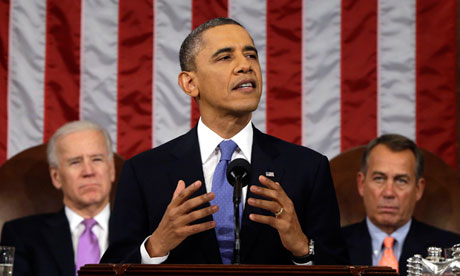In his State of the Union address, Barack Obama proposed that every child in America have free access to early childhood education (pre-K). In essence, he wants to extend the government's support of free education for all citizens from K-12 to Preschool-12. Back in 1965, the controversial Head Start program was created to fill this need, with a focus on disadvantaged children, but it has been poorly managed and poorly executed.
As is often the case with State of the Union proposals, there was no plan for how to finance what would be the largest expansion of public education in decades. Even so, people are lining up to support it, including conservative New York Times columnist David Brooks (The Social Animal). It's not likely that other conservatives will line up behind Brooks - few others possess his interest in and knowledge of psychology, neuroscience, and the role of culture in human development.
When Families Fail
By DAVID BROOKS
Published: February 14, 2013
Today millions of American children grow up in homes where they don’t learn the skills they need to succeed in life. Their vocabularies are tiny. They can’t regulate their emotions. When they get to kindergarten they’ve never been read a book, so they don’t know the difference between the front cover and the back cover.
David Brooks
But, starting a few decades ago, we learned that preschool intervention programs could help. The efforts were small and expensive, but early childhood programs like the Perry and Abecedarian projects made big differences in kids’ lives. The success of these programs set off a lot of rhapsodic writing, including by me, about the importance of early childhood education. If government could step in and provide quality preschool, then we could reduce poverty and increase social mobility.
But this problem, like most social problems, is hard. The big federal early childhood program, Head Start, has been chugging along since 1965, and the outcomes are dismal. Russ Whitehurst of the Brookings Institution summarizes the findings of the most rigorous research: “There is no measurable advantage to children in elementary school of having participated in Head Start. Further, children attending Head Start remain far behind academically once they are in elementary school. Head Start does not improve the school readiness of children from low-income families.”
Fortunately, that is not the end of the story. Over the past several years, there’s been a flurry of activity, as states and private groups put together better early childhood programs. In these programs, the teachers are better trained. There are more rigorous performance standards. The curriculum is better matched to the one the children will find when they enter kindergarten.
These state programs, in places like Oklahoma, Georgia and New Jersey, have not been studied as rigorously as Head Start. There are huge quality differences between different facilities in the same state or the same town. The best experts avoid sweeping conclusions. Nonetheless, there’s a lot of evidence to suggest that these state programs can make at least an incremental difference in preparing children for school and in getting parents to be more engaged in their kids’ education.
These programs do not perform miracles, but incremental improvements add up year by year and produce significantly better lives.
Enter President Obama. This week he announced the most ambitious early childhood education expansion in decades. Early Thursday morning, early education advocates were sending each other ecstatic e-mails. They were stunned by the scope of what Obama is proposing.
But, on this subject, it’s best to be hardheaded. So I spent Wednesday and Thursday talking with experts and administration officials, trying to be skeptical. Does the president’s plan merely expand the failing federal effort or does it focus on quality and reform? Is the president trying to organize a bloated centralized program or is he trying to be a catalyst for local experimentation?
So far the news is very good. Obama is trying to significantly increase the number of kids with access to early education. The White House will come up with a dedicated revenue stream that will fund early education projects without adding to the deficit. These federal dollars will be used to match state spending, giving states, many of whom want to move aggressively, further incentive to expand and create programs.
But Washington’s main role will be to measure outcomes, not determine the way states design their operations. Washington will insist that states establish good assessment tools. They will insist that pre-K efforts align with the K-12 system. But beyond that, states will have a lot of latitude.
Should early education centers be integrated with K-12 school buildings or not? Should the early childhood teachers be unionized or certified? Obama officials say they want to leave those sorts of questions up to state experimentation. “I’m just about building quality,” Education Secretary Arne Duncan told me. The goal is to make the federal oversight as simple as possible.
That’s crucial. There’s still a lot we don’t know about how to educate children that young. The essential thing is to build systems that can measure progress, learn and adapt to local circumstances. Over time, many children will migrate from Head Start into state programs.
This is rude to say, but here’s what this is about: Millions of parents don’t have the means, the skill or, in some cases, the interest in building their children’s future. Early childhood education is about building structures so both parents and children learn practical life skills. It’s about getting kids from disorganized homes into rooms with kids from organized homes so good habits will rub off. It’s about instilling achievement values where they are absent.
President Obama has taken on a big challenge in a realistic and ambitious way. If Republicans really believe in opportunity and local control, they will get on board.
A version of this op-ed appeared in print on February 15, 2013, on page A27 of the New York edition with the headline: When Families Fail.


No comments:
Post a Comment